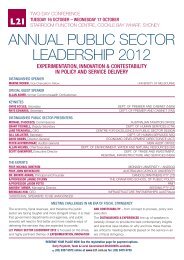Thinking the Unthinkable
Thinking-the-Unthinkable-cima-report
Thinking-the-Unthinkable-cima-report
Create successful ePaper yourself
Turn your PDF publications into a flip-book with our unique Google optimized e-Paper software.
THINKING THE UNTHINKABLE; A NEW IMPERATIVE FOR LEADERSHIP IN THE DIGITAL AGE<br />
7<br />
such a mild illness … we weren't aware it could cause any o<strong>the</strong>r problems till very<br />
recently,” admitted Professor Sarah Gilbert of <strong>the</strong> Oxford Jenner Institute. 9<br />
Why did leaderships appear to be not just flailing but in freefall as <strong>the</strong>y tried to respond<br />
belatedly to ‘unthinkables’ like <strong>the</strong>se? Why have corporate and government responses<br />
appeared to be so inadequate? In response to our questioning on why it remains so<br />
difficult to think <strong>the</strong> unthinkable, nine key words and phrases kept being repeated during<br />
<strong>the</strong> confidential interviews:<br />
1. BEING OVERWHELMED BY MULTIPLE, INTENSE PRESSURES<br />
2. INSTITUTIONAL CONFORMITY<br />
3. WILFUL BLINDNESS<br />
4. GROUPTHINK<br />
5. RISK AVERSION<br />
6. FEAR OF CAREER LIMITING MOVES (CLMs)<br />
7. REACTIONARY MIND-SETS<br />
8. DENIAL<br />
9. COGNITIVE OVERLOAD AND DISSONANCE<br />
‘UNTHINKABLES’: WHAT ARE THEY?<br />
First, <strong>the</strong>re are ‘Black Swans’. These are <strong>the</strong> events or developments for which “we don’t realise<br />
what we don’t realise”. 10 But <strong>the</strong>y occur with ever increasing regularity and high global visibility.<br />
They are, indeed, what <strong>the</strong> former US Defence Secretary Donald Rumsfeld memorably<br />
referred to as ‘unknown unknowns’. Among interviewees <strong>the</strong>re were different views as to<br />
whe<strong>the</strong>r such ‘unthinkables’, ‘Black Swans’ or ‘unknown unknowns’ can ever be thought<br />
about and predicted. That is especially if, by <strong>the</strong>ir very nature, <strong>the</strong>y occur due to ei<strong>the</strong>r<br />
strategic calculation or miscalculation by o<strong>the</strong>rs.<br />
Second, are those ‘unthinkables’ described as ‘Black Elephants’. 11 These are what is<br />
usually well-known and present ‘in <strong>the</strong> room’, wherever and whatever that is defined<br />
as. They are ‘known unknowns’ in Rumsfeld-speak. But while <strong>the</strong>y are known about, for<br />
whatever reason <strong>the</strong>y are ignored, discounted, bypassed or not reported up <strong>the</strong> line. This<br />
is despite being logged, present and known about. The concept of ‘Black Elephants’ helps<br />
explain why a significant number of interviewees – especially those from public service –<br />
suggested that <strong>the</strong> phrase, “<strong>Thinking</strong> <strong>the</strong> Unpalatable” is more appropriate. They argued<br />
it defines with greater precision <strong>the</strong> nature of <strong>the</strong> new challenge of non-normative<br />
developments, which seem to have been ignored, or not taken account of, in <strong>the</strong> way that<br />
events require. What needs to be investigated most urgently is what it is about modern<br />
leadership and current management culture and practice that makes it so hard to think<br />
<strong>the</strong> unthinkable or <strong>the</strong> ‘unpalatable’.



